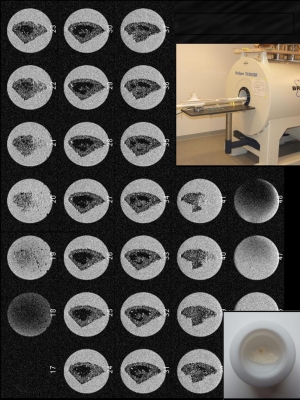NMR methods for the characterisation of mass transport in porous materials
The project aims at the application of optimised methods of nuclear magnetic resonance imaging (MRI) and NMR spectroscopic imaging (MRSI) for a non-invasive characterisation of porous materials as well as transport processes and catalytic reactions considered in other projects of the graduate school. MRI and MRSI measurements allow to determine the spatial distribution of liquids or gases within the pores as well as their properties such as relaxation, chemical shift or flow velocity. The project will comprise the development of measurement methods optimised for the applications considered, their implementation on a modern 7-Tesla NMR imaging system (Bruker Biospec 70/20 USR) as well as the application of these methods, the latter in cooperation with other Ph.D. students of the graduate school. Two methodological approaches will be preferred: (a) MRI methods with high spatial resolution and minimised delay between signal excitation and signal detection to take account of the short transverse relaxation times in porous samples with small pore size, resulting in a fast signal decay (cf. Fig.); (b) multislice MRSI methods enabling the spatial encoding as fast as possible to achieve high spatial resolution and to detect and quantify signals in spite of fast transverse relaxation, diffusion and flow effects. The results of MRI and MRSI measurements will be compared to those of high resolution X-ray computer tomography (micro-X-CT, project FP7) aiming at cross-validating the methods and determining the preferred fields of application for NMR based methods and micro-X-CT. As an example of a 3D MRI measurement with ultrashort echo time, the figure displays images of adjacent slices measured on a ceroxyd sample filled with and surrounded by water in a teflon sample holder (cf. subfigure bottom right) using the available 7-Tesla imaging system (cf. subfigure top right)



